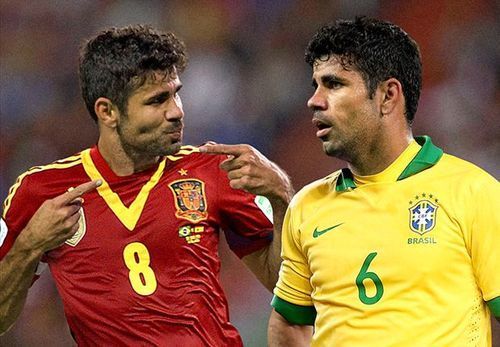#diego costa

As soccer expands, it is redefining the meaning of “nationality.”
All of you who’ve paid attention to soccer news in recent weeks can go ahead and join me in hammering the final nail into international soccer’s coffin. It’s been a long, slow slide, but it has now officially been eclipsed by the club game.
The main culprit is the inexorable march of globalization. International soccer used to represent a cluster of nations coming together to fight for their particular brand of football, and by extension their particular culture. But the world became more mobile. Boundaries dissolved, and players increasingly transfer from country to country just as they would clubs. A typical weekend Champions League match now features more talent – and often just as much diversity – as the World Cup.
That movement of talent throughout the world means that loyalties are increasingly fluid as well. Deco, Pepe, Marcos Senna and Camoranesi are just a few who have traded in their native nations for new ones. Senna and Camoranesi even won titles with those new sides. Choosing between the place you were born and the place you were raised is a fundamental career move for many of these athletes.
Diego Costa has taken that one step further. In choosing recently to play for Spain, the native Brazilian has redefined what “nationality” means within the football world.
The official FIFA rule is that you can play for any nation where you hold citizenship or have a blood relative. However, your loyalty is not established until you play for one country in an official, competitive FIFA match. This has helped the U.S. in a number of instances, most notably with Jermaine Jones. He played for Germany, but only in a friendly, leaving him eligible to switch to the U.S. later on.
What Diego Costa has done is somewhat different. He has not only played for Brazil in a friendly, but was selected to play for the national team in upcoming matches, with the expectations that he would be a main component of the World Cup team. But he rejected that call-up and took up Spain’s colors instead, a country whose connection to him is limited to his five years of residency. In essence, Spain bought Costa from Brazil. Fully aware of its limitations up top, it went out and found a top striker much the way Real Madrid would if they needed to replace their own forward, Karim Benzema.
Costa’s decision, nor the choices made by New Jersey-born Italian-American Giuseppe Rossi or Senna, Comranesi or any of the others, are particularly right or wrong here. It’s just the reality, one created by FIFA’s lax nationality guidelines. The organization is extending a convenience to the participants of a global — and globalized — game, but it does so at the risk of losing the nationalistic essence that for so long set the international game apart.
–
Zach Ricchiuti is a contributor and resident soccer expert for Began in ‘96.
Soooo Chelsea right now.
